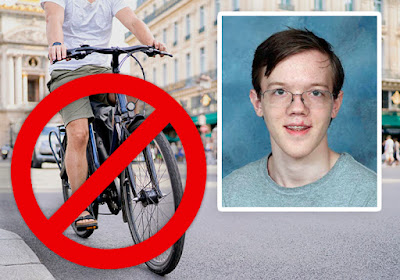Before firing the shot that grazed Donald Trump’s ear, Thomas Matthew Crooks (Can you think of a better name?) scoped out the area around the rally—on his bicycle.
Oh, and we’ve all seen videos of President Joe Biden wobbling and falling off his Trek.
What does that mean? For the first time in US history, a bicycle was involved in endangering the lives of both major-party candidates in a Presidential elections.
Bicycles! We all know they’re a Green Commie Chinese device to undermine national security. Therefore…We simply must ban them.
Of course you know, dear readers, that I would never propose anything so outrageous. Rather, it’s the premise of a Washington Free Beacon editorial.
Its author, Andrew Stiles, clearly labels his work as “satire.” As such, it’s very good—even if, as I suspect, he is lampooning his and the WFB’s editorial board’s idea of what cycling, recycling, gender-“changing” pinkos like me think about guns.
Another school shooting. Ban all guns.
For the record, I am not at all in favor of outlawing firearms. I have not so much as handled one in more than four decades. But I understand that if I were to pick one up, I won’t be on a slippery slope to shooting up a shopping mall.
Two of my uncles were hunters. I have been in rural homes where the meat in the freezer came from a family member’s skill with using a rifle that was propped against a wall. And, as the matriarch of one such family pointed out, in a remote area like hers, it could take the police an hour to arrive in response to an emergency call. That is, if they can even get to a house like hers, which may not be accessible from a paved road.
So, of course I don’t favor, any more than Bernie Sanders, “taking everyone’s guns away.” I do favor, however, stronger safeguards against unbalanced people getting their hands on weapons of war.
That said, I also think that to keep kids safe, we need to post copies of the Ten Commandments in every classroom*—just as we need to Andrew Stiles’ proposal to keep this country—and its presidential candidates—safe.
*—I would love to hear how a teacher might explain #7 to a second-grader.



